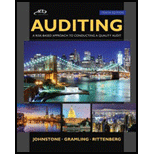
Auditing: A Risk Based-Approach to Conducting a Quality Audit
10th Edition
ISBN: 9781305080577
Author: Karla M Johnstone, Audrey A. Gramling, Larry E. Rittenberg
Publisher: South-Western College Pub
expand_more
expand_more
format_list_bulleted
Concept explainers
Textbook Question
Chapter 17, Problem 64RSCQ
Is it unethical for a company to provide a sustainability report, but provide no assurance on the reliability of the information Contained therein?
Expert Solution & Answer
Trending nowThis is a popular solution!

Students have asked these similar questions
What was the net income from operations?
Compute the tax liability of both companies on these financial accounting question
Regal Properties (RP) just acquired land and a building for a single sum of $500,000. An independent appraisal determined the fair values of the assets (if purchased separately) at $350,000 for the land and $250,000 for the building. Prepare the journal entry in table format to record the purchase of the land and building.
Chapter 17 Solutions
Auditing: A Risk Based-Approach to Conducting a Quality Audit
Knowledge Booster
Learn more about
Need a deep-dive on the concept behind this application? Look no further. Learn more about this topic, accounting and related others by exploring similar questions and additional content below.Similar questions
- You work for a beverage company that sells coffee and tea. Your boss has asked you to help set up thecompany’s new database using Microsoft Access and then perform some queries in Access to determineinformation that your boss needs to give to the senior management. You are given a flat file(Beverage_Co_Sp25.xls) with the company’s sales information. When you open the file, you notice that it is notset up in efficient tables. You must create efficient tables in Excel before importing the data into MicrosoftAccess. Then, you need to run queries to gather the information your boss needs.Excel InstructionsYou will need to create 5 efficient tables from the one worksheet in the Excel file you have been given:Customers, Employees, Sales, Inventory, and SalesItems. You will need to determine which columns need to beincluded in each table and delete any duplicates and blank rows in the tables.Furthermore, once you have created the Sales table, make sure to change the name of the…arrow_forwardProvide correct answer general accounting questionarrow_forwardMeric Mining Inc. recently reported $16,300 of sales, $7,900 in operating costs other than depreciation, and $1,600 in depreciation. The company had no amortization charges, it had outstanding $6,550 of bonds that carry a 6.50% interest rate, and its federal-plus-state income tax rate was 40%. How much was the firm's net income after taxes? Meric uses the same depreciation expense for tax and stockholder reporting purposes.arrow_forward
arrow_back_ios
SEE MORE QUESTIONS
arrow_forward_ios
Recommended textbooks for you
 Auditing: A Risk Based-Approach to Conducting a Q...AccountingISBN:9781305080577Author:Karla M Johnstone, Audrey A. Gramling, Larry E. RittenbergPublisher:South-Western College Pub
Auditing: A Risk Based-Approach to Conducting a Q...AccountingISBN:9781305080577Author:Karla M Johnstone, Audrey A. Gramling, Larry E. RittenbergPublisher:South-Western College Pub Auditing: A Risk Based-Approach (MindTap Course L...AccountingISBN:9781337619455Author:Karla M Johnstone, Audrey A. Gramling, Larry E. RittenbergPublisher:Cengage LearningBusiness/Professional Ethics Directors/Executives...AccountingISBN:9781337485913Author:BROOKSPublisher:Cengage
Auditing: A Risk Based-Approach (MindTap Course L...AccountingISBN:9781337619455Author:Karla M Johnstone, Audrey A. Gramling, Larry E. RittenbergPublisher:Cengage LearningBusiness/Professional Ethics Directors/Executives...AccountingISBN:9781337485913Author:BROOKSPublisher:Cengage- Principles of Accounting Volume 2AccountingISBN:9781947172609Author:OpenStaxPublisher:OpenStax College

Auditing: A Risk Based-Approach to Conducting a Q...
Accounting
ISBN:9781305080577
Author:Karla M Johnstone, Audrey A. Gramling, Larry E. Rittenberg
Publisher:South-Western College Pub

Auditing: A Risk Based-Approach (MindTap Course L...
Accounting
ISBN:9781337619455
Author:Karla M Johnstone, Audrey A. Gramling, Larry E. Rittenberg
Publisher:Cengage Learning

Business/Professional Ethics Directors/Executives...
Accounting
ISBN:9781337485913
Author:BROOKS
Publisher:Cengage

Principles of Accounting Volume 2
Accounting
ISBN:9781947172609
Author:OpenStax
Publisher:OpenStax College

Pricing Decisions; Author: Rutgers Accounting Web;https://www.youtube.com/watch?v=rQHbIVEAOvM;License: Standard Youtube License